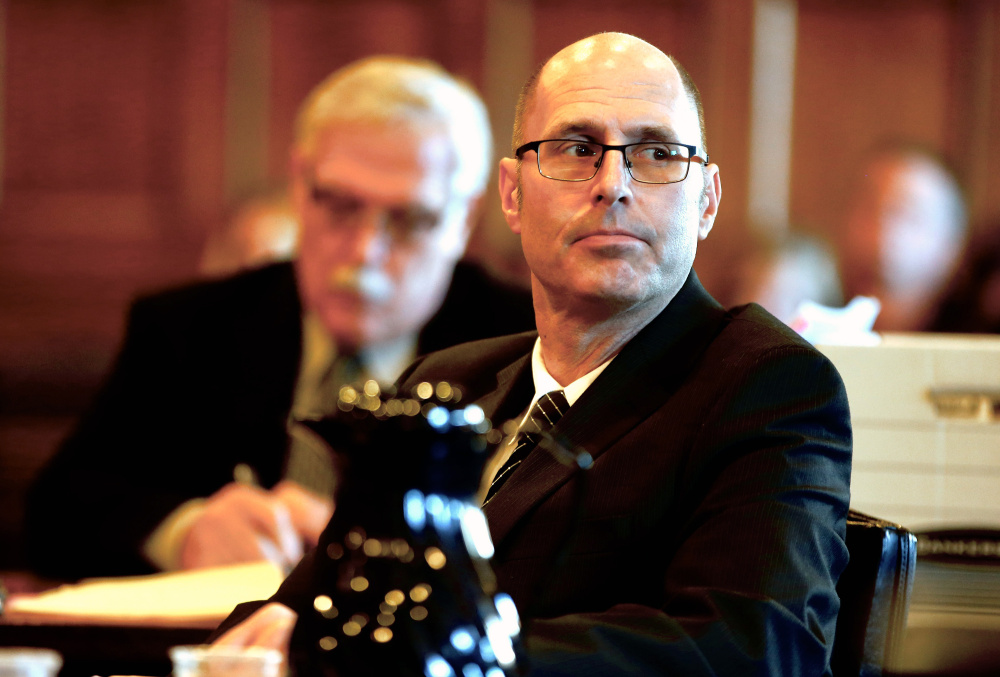A Superior Court Justice is expected to issue a verdict next week in the manslaughter trial of Portland landlord Gregory Nisbet.
Justice Thomas Warren continues to review the evidence presented at the weeklong trial that ended Oct. 7. He also is reviewing additional filings submitted this week by the prosecutors and defense lawyers that included technical arguments about how the law should be applied to key evidence presented during the trial.
Because Nisbet waived his right to a jury trial, Warren alone will decide whether the Portland landlord is guilty of manslaughter in connection with the apartment building fire that killed six people two years ago. Nisbet is charged with one count of manslaughter for each of the fire victims, as well as five misdemeanor code violations.
The fire on Nov. 1, 2014, started when a plastic cigarette butt receptacle caught fire, igniting the front porch, a couch and other items. It quickly spread through the house after Steven Summers, who was visiting a friend, opened the front door to escape. He died of his burns days later.
The fire’s victims included tenants David Bragdon Jr., 27, Ashley Thomas, 29, and Nicole Finlay, 26. Summers, 29, of Rockland, Maelisha Jackson, 23, of Topsham, and Christopher Conlee, 25, of Portland, were visiting the house and also died.
During Nisbet’s trial, prosecutors argued that his management of the building on Noyes Street and failure to comply with safety standards led to the fire becoming Maine’s deadliest in 40 years. Nisbet’s lawyers, on the other hand, defended his management of the building and argued that the fire was so intense and fast-moving that alarms and additional escape routes would not have helped the victims escape.
If convicted, Nisbet will be the first landlord in Maine found guilty of manslaughter for an accidental fire.
Warren would have to find that Nisbet was reckless or criminally negligent, beyond a reasonable doubt, in managing his duplex at 20-24 Noyes St. to find him guilty of manslaughter, which is punishable by as much as 30 years in prison and a $50,000 fine.
A spokesman for the Attorney General’s Office, Timothy Feeley, said prosecutors planned to submit their legal filing by the end of the day Friday but he was unable to provide any details about what it might include. The state’s case against Nisbet was prosecuted by Assistant Attorneys General John Alsop and Bud Ellis.
Defense Attorney Matthew Nichols said his filing urges Warren to consider what is called a “culpable state of mind” in relation to the alleged code violations that the state argues caused the deaths. That means Warren would have to find proof that Nisbet had been warned by the city about the five alleged code violations – such as a lack of an emergency exit from the third floor, where three people died – and chose to do nothing about it, Nichols said.
Nichols said he believes Nisbet cannot be found guilty of manslaughter simply because of the existence of code violations. If that were the case, then a tenant could take down a smoke detector immediately after it’s installed and the landlord would still be help responsible, he said.
“We’re saying that doesn’t make any sense,” Nichols said.
During the trial, Assistant Attorney General Bud Ellis and defense attorney Matthew Nichols painted starkly different pictures of the fatal night and offered conflicting opinions about whether better fire protection systems would have saved lives.
Prosecutors argued that Nisbet ran the property as a rooming house, which is supposed to have more safety equipment than a traditional apartment building. But, whether or not it qualified as a rooming house, the third-floor rentals were never permitted by the city and became death traps because there were no escape routes for the three people who died on the top floor.
Ellis highlighted the fact that Nisbet had stopped making mortgage payments on the property in 2011, putting the property in foreclosure the next year. As he continued to collect rent, Nisbet failed to obtain leases from a revolving cast of tenants and failed to maintain the property, including ensuring that smoke detectors were present and in working condition.
Nisbet’s hands-off attitude was apparent, Ellis said, when Nisbet went ahead with his plans to play two tennis matches in Rockport after learning that at least one person had died in the fire.
Nichols, the defense attorney, argued that the state failed to prove that the tenants, most of whom were intoxicated and sleeping, would have escaped the fire were it not for the actions of the landlord. He also pointed to testimony from former residents that it was the tenants who removed smoke detectors and were responsible for the trash, couch and other items that fed the flames.
Correction: This story was updated at 10:31 a.m. on November 2, 2016 to correct the age of Ashley Thomas.
Send questions/comments to the editors.



